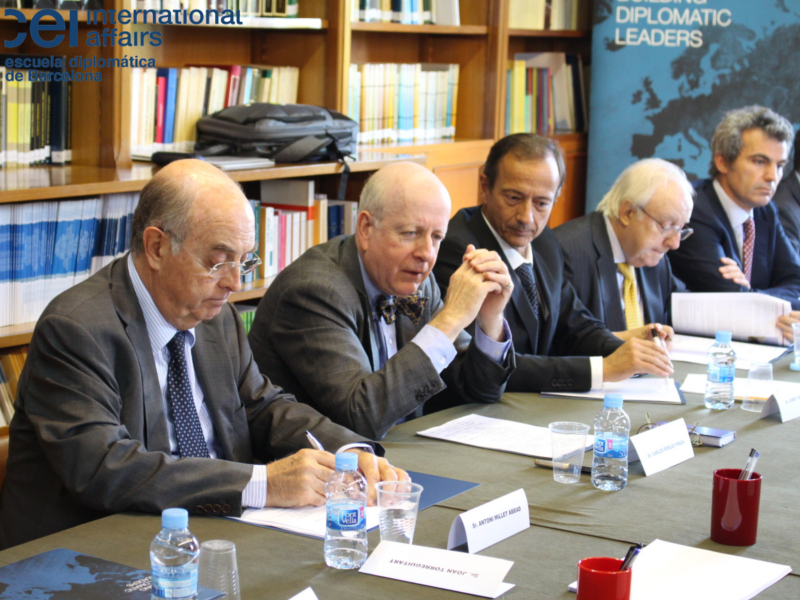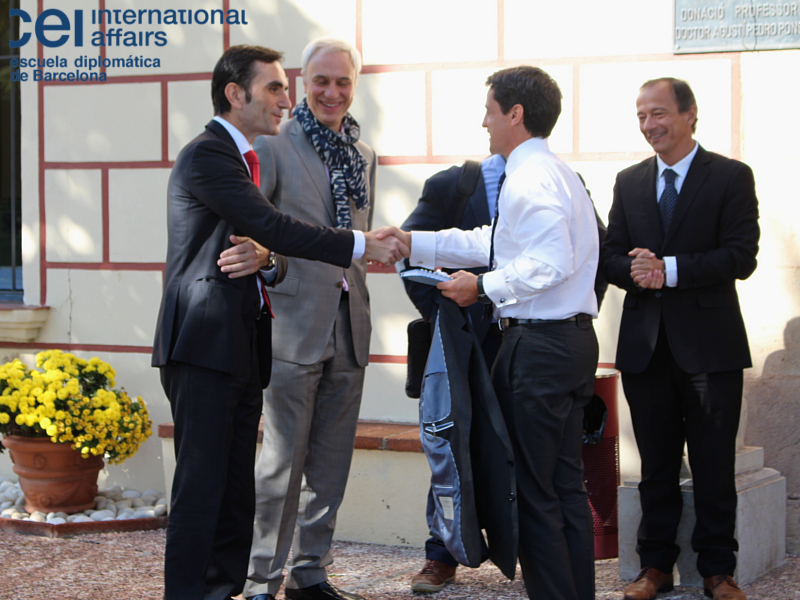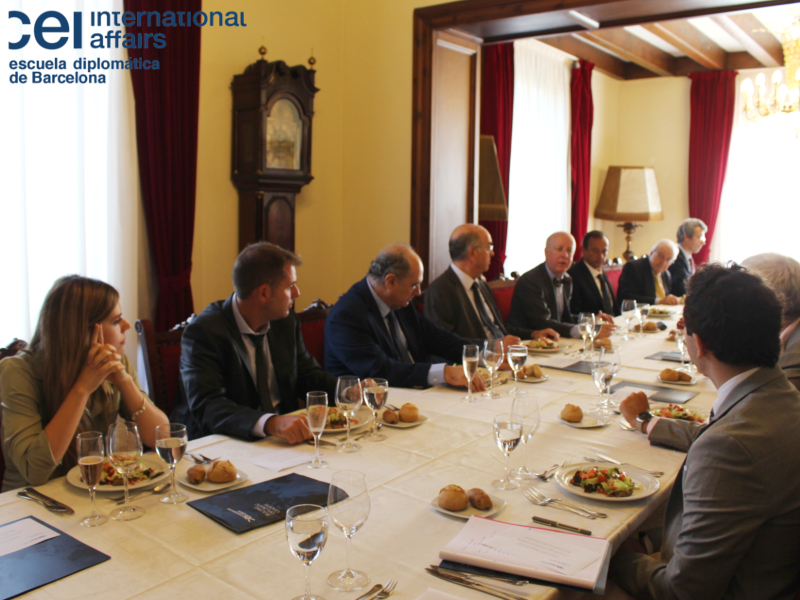The Ambassador of Spain to Chile, the Hon. Mr. Carlos Robles Fraga, was invited by the CEI International Affairs in the framework of the “International Classroom Program“. The meeting was attended by important personalities from the business, university and economic world, as well as other members of Spanish diplomacy.
The Ambassador began his presentation with a brief review of the colonial and postcolonial history of Chile. To understand it, an essential element is the “insularity” of the country: with a vast ocean to the west, an impenetrable mountain range to the east, the Atacama Desert to the north and, initially, a territory to the south without exploring beyond the Biobío River, in the colonial times, Chile was much smaller than we see today on maps. These geographical characteristics have made Chileans a people with their own characteristics, even sharing many cultural features with the countries around them. Even today, the diplomatic relations with Peru and the deficient infrastructures that connect the country with Argentina are the result of that Chile-island.

That is why, for the Ambassador, the biggest mistake a Spaniard could make when arriving in Chile “is to think that they are equal to us“. On the contrary, one must be aware that Chilean culture is different from Spanish culture and that, despite having a common language, there are particularities that must be identified quickly, such as the abruptness of the peninsula’s accent in the ears of Chileans, or the particularly Chilean way of saying no without offending your interlocutor.
From this historical exhibition, it is worth highlighting an impression that the Ambassador shared with the audience, saying that one cannot understand the current Chilean society without having in mind the agricultural structure of the Chilean haciendas and, above all, it’s clearly hierarchical nature, with a “pattern” located on the cusp of it. Hence, today we observe a clearly centralized republic -with approximately 7 of the nearly 18 million inhabitants residing in the metropolitan area of the capital, where also the main universities and institutions are located- and a very legalistic society, with circles of power clearly defined in which everyone is known. For the Ambassador, the elites of the country have been changing throughout its history, but those changes have not questioned the hierarchical system itself. That is why, unlike some of its neighbors, when Chile reached independence, the first century of the republic was a very stable period.
After a painful dictatorship, Chile has known in the last decades a remarkable prosperity, passing its income per capita from the $ 2,000 in 1990 to the current $ 14,000, joining the OECD and reducing their poverty from 40% to 11%. Even so, the indices still show relatively high levels of inequality, which the Ambassador attributed to a “social inequality”, rather than a simple material inequality, since regardless of the personal qualities that one may have, it is still difficult to access positions of power if they have not taken certain university studies in the capital.

In the words of Robles Fraga, Chile represents undoubted opportunities for the Spanish investor. It is a consolidated, stable democracy, with important solvent institutions: a modern and efficient criminal system, a transparent bidding system open to foreign companies, and an economic system influenced by the economic neoliberalism of the Chicago school that was implemented in the country under the Pinochet regime.
However, to these positive aspects must be added a dose of caution if you want to avoid that the Chilean adventure ends in failure. On the one hand, the Ambassador recommended that the attendees not try to go to Chile in a hurry, without knowing the surroundings. The insularity of the country has made the Chilean a person who will not trust the first foreigner, however interesting his offer may be. It is therefore advisable to prepare the investment well and ensure a network of contacts in Chile that allows the Spanish to prove their solvency and effectiveness. Another reason for caution is the current economic situation in Chile: the second term of President Bachelet has been marked by an economic situation that continues to be positive, with a growth of 1.5%, but which is far from the growth rates of the 5% or even 7% that Chile experienced at some moments during the 2000s.
What can Spaniards offer to Chile?
During the lunch that followed the presentation, one of the attendees asked the Ambassador what the Spaniards could offer to Chile. Mr. Robles Fraga responded that, at present, the Chilean economy is based around mining, agriculture and salmon fishing.

At the end of the meeting, Robles Fraga had the opportunity to encourage all attendees to explore the economic opportunities that Chile represents. For this, he stressed that diplomatic relations between Spain and Chile are so positive and stable “that they become boring,” in the best sense of the word. Chile and Spain share a similar vision of the world.
Eventually, the Ambassador put himself at the disposal of the assistants to help them in their future investments in Chile, and assured them that the Spanish diplomacy in the country had experience helping investors to deal with the Chilean administration. Finally, and taking advantage of the presence of attendees from the university world, the ambassador congratulated the good reputation of the Spanish university education in Chile, particularly the master’s programs offered in Barcelona, encouraging attendees to deepen the educational ties between both countries
Report prepared by Guillem Manso
Student of the Preparation Course to Join the Diplomatic Corps